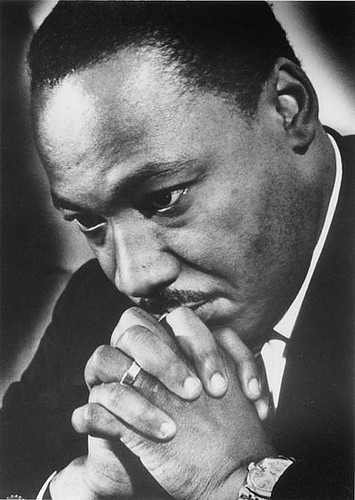My wife and I saw Ava DuVernay's
Selma last night. Focused on the voting rights efforts that took place in a small Alabama town in 1965,
Selma provides a powerful glimpse into the leadership of Rev. Martin Luther King, Jr. and the Civil Rights movement that transformed our country.
One of the things that I appreciated most about the movie was that Dr. King was not presented as a perfect, Messiah-type of figure. DuVernay shows us King as the noble leader that he was but doesn't ignore some of the more unsavory aspects of his personal life of which many modern day Americans are unaware.
Similar to towering figures of the Bible such as King David or Simon Peter, Dr. King was an imperfect person that made himself available for God to do great things through him. Though obviously gifted as an orator and leader, Dr. King was just a man. But he was a man that was willing to sacrifice his personal comfort -- and eventually his life -- so that freedom and dignity could come to all women and men.
In focusing on King's humanity,
Selma demonstrates the difference that fallen people can make in our world when submitted to God's service.
One of the scenes that I found most moving took place fairly early on in the film. King (played brilliantly by the talented
David Oyelowo) finds himself alone late at night in the family kitchen. It is obvious that he is feeling the weight of his call while dealing with the stresses of family life in the midst of preparing to leave for yet another march. He slowly walks to the phone and places a call to the noted gospel singer, Mahalia Jackson. He asks her to sing for him over the phone. Though she had been in a deep sleep just seconds before, she breaks into a powerful chorus of "Precious Lord Take My Hand":
Precious Lord, take my hand
Lead me on, let me stand
I'm tired, I'm weak, I'm worn
Through the storm, through the night
Lead me on to the light
Take my hand precious Lord, lead me home
Just like us, Dr. King needed God's strength to do what God had called him to do. As we prepare to celebrate the MLK federal holiday this weekend,
Selma provides a fitting reminder of how far our country has come...and how far we still have to go.
Jason Cook has provided a fuller review of the movie on
The Gospel Coalition website. Here's a highlight:
"Selma does not cower away from the physical and emotional brutality of the struggle for African American voting rights in Selma, Alabama, during a three-month period in 1965. By concentrating on this historical vignette, Selma shines.
Rather than approaching this biopic as a quest to compile the highlights of a venerated figure’s life, Selma director Ava DuVernay focuses on a tiny window of history that changed history. SCLC uniforms (black suits, white shirts, and thin black ties) and scarred stoic faces juxtaposed against the pressed and unkempt uniforms of police officers and state troopers as they clash throughout the film in raw and ugly dispute.
Further, Selma does not cower from exposing the moral failings of Dr. Martin Luther King. While the impact of Dr. King’s leadership of the Civil Rights movement is magnanimous and will rightly reverberate into history, he suffered from the common condition of profound creaturliness. This fellowship with mere mortals is a surprising strength of the film. Dr. King appears, well, human.
Throughout Selma he’s tired from long nights, distracted by threats to his family, fearful for the lives of the faithful, and doubtful concerning the ultimate end of the movement—a side of “Doc” we seldom see in grainy microfiche. The film tastefully addresses his smoking habit, his insatiable appetite for food, and his covert sexual promiscuity. Raw and honest, DuVernay portrays a terrestrial Dr. King who is pedestrian at worst and valiant at best—all the while honoring him as a towering historical figure worthy of remembrance."
To read the full review, please click
here.
I highly encourage you to see this film. To find tickets for your local theater, please visit
here. The dream lives on.

